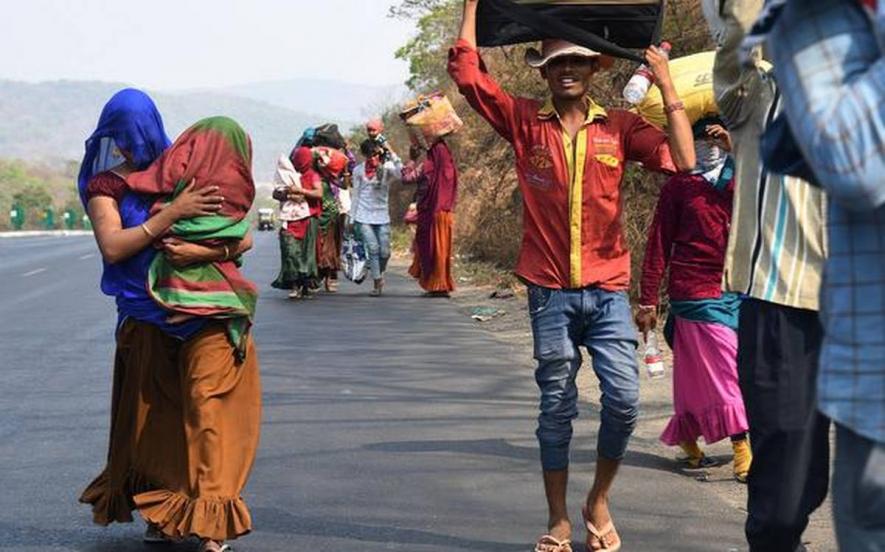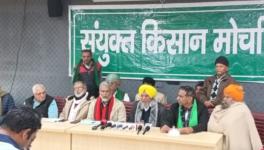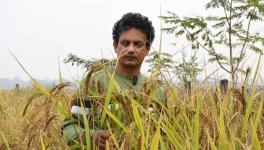Migrant Workers From West Bengal Live Precarious Lives Amid Economic Turmoil

Image Courtesy: The Hindu
Kolkata/ Baharampore: Samrat Karyi (18) of Madhupur gram panchayat of Coochbihar had gone to Rajasthan to work as a migrant labourer in the construction sector. He boarded the Bikaner Guwahati express to return home with his brother. When he was nearing the Coochbihar Junction, he went to the toilet and just then, a fatal train accident occurred, taking his life.
However, his brother's life was saved. His father, Someshwar Karyi, a septuagenarian, works as a part-time fisherman catching fish from rivers and inland water bodies. Samrat could barely make his ends meet, and as a result, with 22 others of his village, he had gone to Rajasthan for work. Subhas ray of Putimari GP area of Coochbihar too worked as a migrant labourer in a cable factory in Jaipur, Rajasthan. He was returning to see his three-month-old daughter in the train, which had earned the nickname of migrant labourers' express, when he died in the accident .
Over thousands of migrant labourers from Coochbihar go to Rajasthan to find employment every year. Then after some months, they come back with their gathered money.
Chiranjeet Barman, another victim, had to move to Rajasthan as he was suffering from gallbladder stones and needed surgery. He could only match his operation costs through the Swasthya Sathi card, which assures a sum of Rs 5 lakhs from the state government for any hospitalisation, in the northern state. Chiranjeets' death has raised questions about the Swasthya Sathi project's efficacy.
Talking with Jamir Mollah, organisational secretary of West Bengal migrant labourers union, Newsclick learnt that in the past one year, the number of unnatural deaths of migrant labourers has been rising in the state. It is especially increasing at an abnormal rate in Murshidabad district, which supplies the largest number of migrant labourers to states like Kerala, Tamil Nadu, Andhra Pradesh, and Rajasthan. About 26 deaths had happened in the district in the last year only, according to Mollah. He pointed out that the 100 days of work under MGNREGA was absent in the villages there, and it had only compounded the problem of livelihood.
However, in the far-flung states, the thikadaars or the work contractors are often frauds and usurp the money workers pay them. Many of the workers are also discriminated against due to their language, which is bengali. They are often wrongfully considered Bangladeshis and are harassed and taken to police stations. [NO QUOTE/ATTRIBUTION]
The Inter-State Migrant Workmen Act, 1979, has been bypassed throughout the country, except in Kerala. The migrant labourers face absolute hardship while working outside their native states and face economic turmoil after returning home, forcing them to leave again. Due to the Centre for Indian Trade Union's demand and the Supreme Court's intervention, the E-Shram portal will have a definite count on the number of migrant labourers active in the country, Mollah said while speaking to Newsclick.
In villages after villages, the only earning male member being outside the home for years also gives rise to social problems, Mollah said. He noted that after the last lockdown, the West Bengal Migrant Labourers' Union had given deputation for providing ration to each family of migrant labourers to the Block Development Officer and had also given submission to the BDOs so that the returning migrant labourers who are at home can be given alternate work in government projects.
In some cases, the Union has been able to forward the complaints of migrant labourers' families to appropriate channels, and the government representatives had to pay a visit to them and solve their problems. In most cases, the problems lie in the children's education and medical causes, such as the treatment of elderly parents of migrant labourers.
The Current Scenario
However, there is no government register of "thikadars" contractors with whom migrant labours go to other states. Whenever any accident happens, the thikadar vanishes. Families of labourers don't find anyone to ask for compensation. They don't even know where the young men work, who is liable for compensation if any situation arises. "There lies the chief crisis," says Mursalim Seikh of Bhagabangola. Seikh belongs to the village from where young men from almost every locality have gone to Karnataka, Kerala, Bihar, Jharkhand, and Uttar Pradesh to work as construction labour.
On May 31, 2021, Iqbal Hossain (19), a boy from Bhagabangola, lost his life in Bihar, where he worked as a labourer on a sewerage pipeline project. Months have passed, but his family received no compensation.
When asked why people were going to other states, the villagers simply replied, "We don't have any work here that pays enough to run a household."
Even children of school-going age have gone to other states to work as construction workers.
Ismail Haq, a teacher in charge of Bhabanipur Barkatia Senior Madarsa, Lalgola, said, "Many students of Secondary level and Higher Secondary level are currently outside West Bengal. We are requesting parents to send them to school, we need them to register themselves for the board examinations, but they are not coming. Parents are saying they have no money to bring them back for school."
The closing of schools during the pandemic also drove away several students from education and led them to become migrant workers.
The lowering income from farming is another reason for the migration of the workforce from agrarian sectors. Chiefly migrant workers come from families of farmers and agrarian workers. But they are finding no reason for sticking to their old profession.
Contrary to the promises by central and state governments, the income of farmers have been lowered.
Returning after lockdown, Mirajul Hasan of Lalgola tried farming. But he faced significant loss. "I had a loan over my head. Though with farming, I will repay a part of it. But every one of our village faced loss," he told Newsclick over the telephone. So Hasan left his village, family and went back to Kerala, where he now works as a labourer in the farm sector.
During the post lockdown period, the villagers were deeply in need of MGNREGA work. But corruption at the local panchayat level allegedly hampered the process of employment generation. In parts of Murshidabad, complaints have been raised regarding the same.
According to Abdul Azad, former Pradhan of Barala Gram Panchayat of Sagardighi, Murshidabad, people were not getting paid even after working on MGNREGA projects. So they had no option to stay in the village without a livelihood. "Many people get a wage of 10 days after working 15 days. There is no one to look into this matter," he said.
Get the latest reports & analysis with people's perspective on Protests, movements & deep analytical videos, discussions of the current affairs in your Telegram app. Subscribe to NewsClick's Telegram channel & get Real-Time updates on stories, as they get published on our website.
























